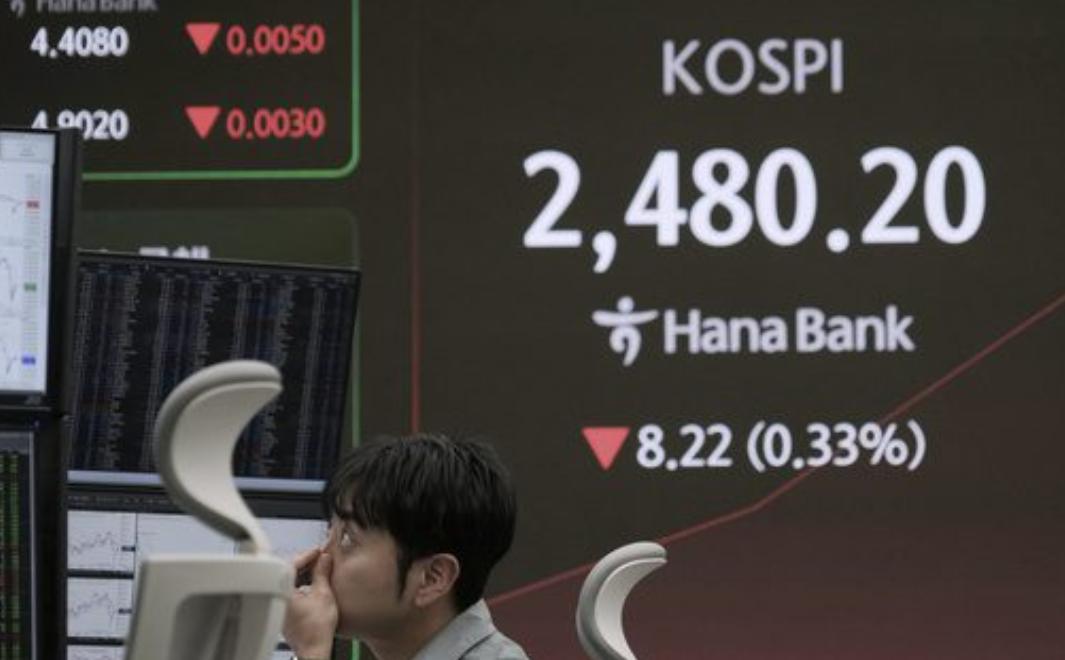U.S. stock markets are on the rise Tuesday morning after companies posted stronger-than-expected earnings, helping to calm investor nerves following Monday’s sharp losses. The S&P 500 was up 1% in early trading, the Dow Jones Industrial Average climbed by 396 points (1%), and the Nasdaq composite gained 1.2%. The U.S. dollar also found stability after falling against the euro and other major currencies. Meanwhile, bond yields held steady, and gold prices continued their upward climb.
This surge comes just a day after markets fell sharply due to growing fears around President Donald Trump’s ongoing trade war and his continued public attacks on Federal Reserve Chairman Jerome Powell. Wall Street futures had pointed to a higher open, with S&P 500 and Dow futures both rising 0.8%, while Nasdaq futures gained 0.9%. However, these gains remain short of recovering Monday’s losses, which saw indexes drop over 2%.
President Trump has been vocally pressuring the Federal Reserve to lower interest rates, arguing that inflation is no longer a threat, citing lower energy and grocery prices. He recently called Fed Chair Jerome Powell “a major loser” and accused the central bank of holding rates unnecessarily high. Despite the political pressure, the Fed has been cautious about reducing rates too quickly, fearing it could reignite inflation — which had previously surged above 9% during the COVID-19 crisis three years ago.
Analysts warn that any move to remove Powell from his position would likely rattle global financial markets. While lower interest rates are generally welcomed on Wall Street due to their positive impact on stock prices, investors worry that a compromised Fed could fail to manage inflation effectively. Such a scenario could harm the United States’ reputation as a stable and reliable safe haven for global capital.
Longer-term bond yields have been rising, reflecting concerns about the U.S.’s economic stability. The 10-year Treasury yield hit 4.43% overnight before easing slightly to 4.39%, still higher than 4.34% at the end of last week. Earlier this month, it had been closer to 4%, marking a notable move for bond markets.
Currency markets showed some volatility, with the U.S. dollar slipping to 140.24 yen from 140.80 yen. On Monday, the dollar temporarily dropped as low as 139 yen — a 52-week low.
In stock news, First Solar surged 7.2% after the U.S. Department of Commerce finalized unexpectedly strict tariffs on some solar products from Southeast Asian countries. On the downside, Northrop Grumman fell 10.6% after reporting a drop in first-quarter sales and nearly halved profits due to losses from its B-21 bomber program amid rising manufacturing costs.
Tech stocks, which have been hit hard by recent volatility, showed modest gains Tuesday morning. Nvidia and Meta Platforms both rose less than 1%. Meta has seen its shares fall for seven straight sessions — the longest losing streak since April 2023.
Tesla shares, which dropped another 6% on Monday, were slightly higher ahead of its quarterly earnings release scheduled for later today. The electric carmaker recently announced a 13% drop in first-quarter vehicle sales compared to the same period last year. The company has faced backlash over CEO Elon Musk’s involvement in a controversial cost-cutting overhaul of U.S. government agencies, fueling protests, vandalism, and calls for consumer boycotts. Tesla stock is down roughly 40% so far in 2025.
In Europe, France’s CAC 40 and Germany’s DAX were each down 0.7%, while the UK’s FTSE 100 was mostly flat by midday.
Asian markets saw mixed trading. Japan’s Nikkei 225 edged down 0.2% to close at 34,220.60. Australia’s ASX 200 was nearly unchanged, slipping by less than 0.1% to 7,816.70. South Korea’s Kospi dipped 0.1% to 2,486.64. Hong Kong’s Hang Seng rose 0.8% to 21,562.32, and China’s Shanghai Composite added 0.3% to reach 3,299.76.
Lingering concerns over U.S. tariffs and China’s retaliatory trade measures continue to cloud the outlook across the region. Analysts suggest that many Asian nations are eager to reach diplomatic solutions, though balancing the negotiations without upsetting China remains a challenge. A statement from China warned other nations not to resolve tariff issues in ways that undermine Beijing’s interests, underscoring the growing geo-economic divide.
In energy markets, U.S. crude rose by 93 cents to $63.34 a barrel, while Brent crude — the global benchmark — gained 88 cents to $67.14 a barrel.














